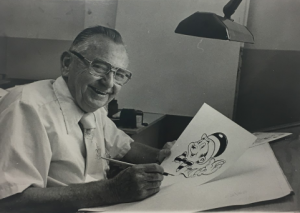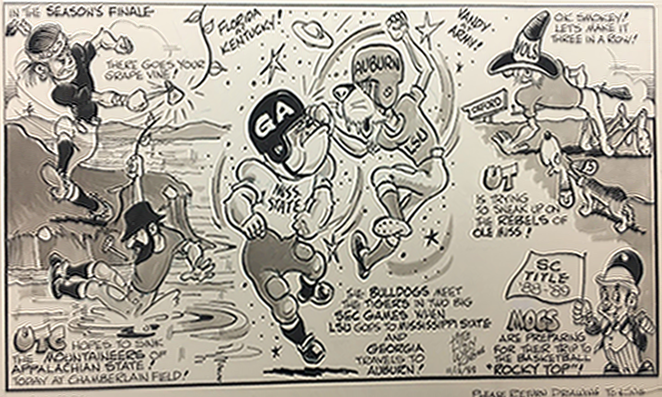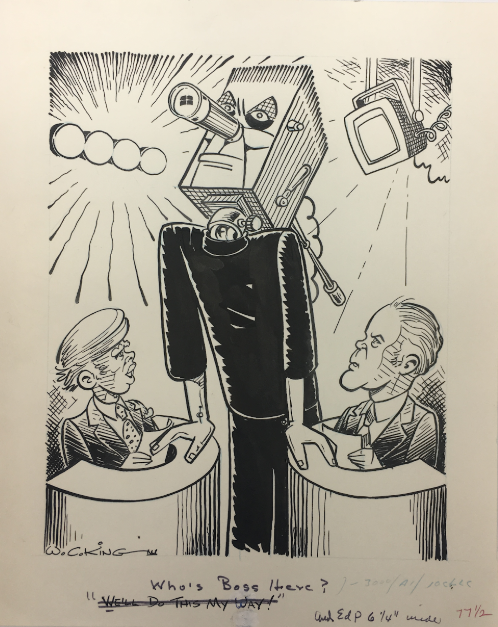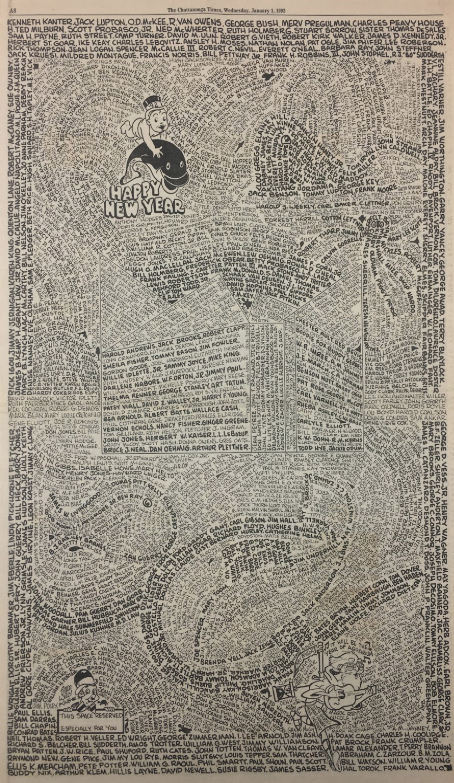***
This post was adapted from a UTC Library blog post by Carolyn Runyon.
This blog post was authored by Okland Scott, an intern in the Library’s Special Collections unit from the UTC Department of History in Fall 2019.

I chose to apply for an internship with the Special Collections thinking that the experience would influence my post graduation plans. I had a vague idea of going to graduate school to become an archivist or a librarian, but aside from this I had only a general idea of how archivists worked. I entered into the internship with the hope that the experience would put the meat on the bare bones of a plan that I had. I desired to work on a project that would expose me to as much of the archiving world as possible. Through this I anticipated getting better acquainted with the nuances of the field, learning a new set of vocabulary, and broadening my perspective on what an archivist was. While my expectations were incredibly vague, I was excited to take on a new challenge.
With these expectations in mind, I undertook the project of processing the Willy King papers. The Willy King papers is comprised of works by Willy King, a long time Chattanooga Times employee. The project had me sifting through boxes of political cartoons, sketches, photographs, and newspaper clippings spanning the breadth of King’s career.I chose to apply for an internship with the Special Collections thinking that the experience would influence my post graduation plans. I had a vague idea of going to graduate school to become an archivist or a librarian, but aside from this I had only a general idea of how archivists worked. I entered into the internship with the hope that the experience would put the meat on the bare bones of a plan that I had. I desired to work on a project that would expose me to as much of the archiving world as possible. Through this I anticipated getting better acquainted with the nuances of the field, learning a new set of vocabulary, and broadening my perspective on what an archivist was. While my expectations were incredibly vague, I was excited to take on a new challenge.
Going through King’s cartoons was the most enjoyable process of the project, in my opinion. I was able to see sketches from a broad spectrum of topics; from lighthearted comics about college sports to political cartoons commenting on the current presidential election debates.

The process of evaluating the cartoons was also enjoyable as I was able to use the skills I have learned during my time as a History major. As a History major, we are asked to use what is called the “five C’s”: Contextualizing, Contingency, Change over time, Causality, and Complexity. These “five C’s” act as a guide and a framework for Historians as they interpret the past. I was able to take these skills that I have practiced throughout my coursework and apply them to my task of processing Willy King’s papers. I was able to look at a sketch and place it in the broader context of what might have been happening at the time in the nation or in Chattanooga. This can be observed in some of King’s cartoons that depicted Russia. The knowledge that King was working during the height of the Cold War helps show that the anxieties towards Russia are reflected in his works.

During this project I was able to learn the specific archival skills I needed through the processing of King’s papers. The objective was to identify the document type, give it a date if it didn’t have one already, and devise a title. During this process I became aware of the importance of detail in this project as I had to frequently make certain I was in compliance with Describing Archives: A Content Standard (DACS). Once all of this information was compiled I then had to transfer the information to ArchiveSpace to create Finding Aids for each piece of the collection. Due to the structured detail required to correctly utilize the program, as well as the size of the Willy King papers, this program required me to have a consistent detailed focus. This became difficult at times, and I had to rely heavily on the Metadata Application Profiles to ensure that my work was correct.

One of my favorite parts of completing this project was uncovering Willy King and who he was. This was done through reading obituaries published in the Times, and critically observing his works. Cartoons such as his annual New Year’s cartoon, which features names of Chattanooga individuals, showcase his character. He was fun and loved people, and he wanted to create a cartoon that communicated that love. Willy King was able to create a sense of belonging in the Chattanooga community by consistently leaving a space for the reader to add their own name to the swirling lists of significant Chattanooga individuals.
My experience in the Special Collections has been incredibly rewarding. I was able to broaden my perspective of what I know as archival work. I have had the unique opportunity to learn a new skill set while pursuing my love for history. The feeling of learning something new, while having the opportunity to immediately put those skills to use in a professional environment was very exciting. I am looking forward to what the future holds, and I am thankful for this experience that has acted as the next step in my education.
